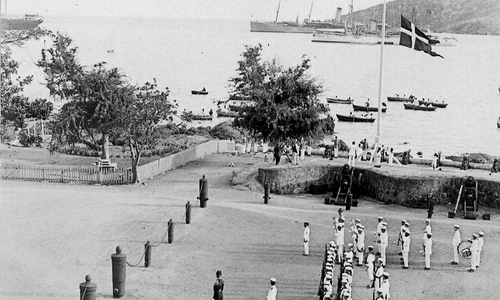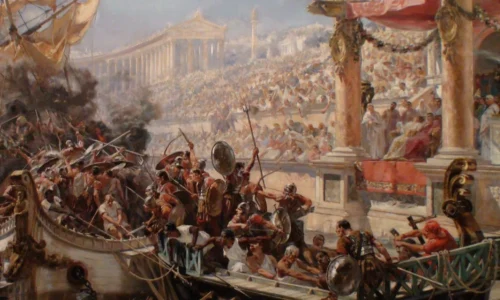
First World War: who's at fault?
What were the main causes of World War I? To what extent were the characters involved – the Kaiser, the Emperor, and the Tsar – crucial to the conflict’s outbreak and can they be held directly responsible for it? Were they at fault for World War I? A renowned American specialist, John G. Stoessinger, has argued that it wasn’t the deep, historically-based causes of European tensions that led to what happened in the summer of 1914, but the personalities of the leaders involved.
John G. Stoessinger is an American political scientist born in Austria a few years before the country was annexed to the German Reich. The Stoessinger family, of Jewish origin, managed to escape the Nazi regime with the help of a Japanese diplomat who offered them visas to travel to Shanghai.
A specialist in international relations, Stoessinger believes that the war is neither impersonal, nor inevitable, arguing that the responsibility for a war doesn't lie solely with certain events, because everything is, in fact, about the decisions that people make. He argues that many conflicts could have been avoided without the use of force or without going to war.
One of the important theories attributed to Stoessinger is the theory of perceptions. Stoessinger believes that, in the eve of major conflicts, many of the political leaders involved have misjudged the situation and have thus led their countries to war. These false perceptions manifest on 4 levels: firstly, a false perception regarding the leader’s own person, of their role in the world and of their loyalty towards the possible outcome of the conflict. The second level regards the opponent and often includes demonising his image and the inability to objectively understand a situation. On the third level, we are dealing with the misperception of the opponent’s intentions and, on the fourth level, with misjudging the opponent’s abilities.
Stoessinger has emphasised the importance of the political leaders’ personalities and the fundamental part they play in the evolution of international relations.
Why nations go to war
These theories of Stoessinger’s have been exemplified in one of his most renowned books, Why nations go to war, in which he analyses the most important military conflicts of the 20th century: First World War, operation Barbarossa, the Korean War, the Vietnam war, the war in Yugoslavia, the India-Pakistan conflict etc.
In the books’ intro, Stoessinger tells how, when he was a student, he was always dissatisfied with the explanations found in history books regarding wars: nationalism, militarism, alliance systems, economic factors and other “fundamental causes” that, according to him, couldn’t be directly linked to the precise moment of a war’s beginning. He argues that these “fundamental causes” of wars throughout history are those forces that people apparently don’t control, although it is people who lie at the base of a conflict. In analysing the 10 conflicts presented in the book, Stoessinger searches for the “moment of truth”, the one in which the leaders take the fatal step towards the war, and he wonders in which precise moment the decision to go to war becomes irreversible, who takes responsibility for it and if the disasters could have been avoided.
The book’s first chapter is dedicated to World War I and is expressively entitled The Iron Dice, referring to the famous words spoken on August 1stby German chancellor Theobald von Bethmann Hollweg: “If the iron dice must roll, may God help us”. In general, because of the history taught in schools or because of popular history books, and not only, most people consider that the so-called fundamental causes of World War I are: the deteriorating balance of power in Europe and the new competitive alliances, the arms race, Germany’s militarism and her claims regarding a larger colonial empire etc. Loyal to his theory, Stoessinger ignores these causes and chooses to analyse the leaders' actions in the war’s eve.
According to the author, all of the political leaders involved were aware of the war’s inevitability and, in spite of this, they couldn’t stop it. More than once, these leaders have denied their responsibility, placing it in the hands of God or destiny. But it wasn’t God who could control the evolution of events and stop the war, was he? Stoessinger’s main theory is that the events weren’t, in fact, incontrollable and that it was the people who made the crucial decisions. And these people weren’t some evil leaders with a thirst for blood and destruction (how the Kaiser is so often portrayed), but worried people stuck inside their own illusions.
Stoessinger believes that the crucial events that pushed the European countries to war were the following:1) the pledge that Germany made to Austria-Hungary regarding her policy towards Serbia;2) the ultimatum Vienna gave to Serbia and its rejection by the Serbs;3) the German efforts to mediate the conflict and tame Austria;4) at last, the declaration of war made by Germany against Russia and the invasion of Luxembourg and Belgium.
Germany makes a promise she can’t take back
The Kaiser learned of the assassination of Archduke Franz Ferdinand only hours after the event in Sarajevo, and he was truly angered, calling the Serbs “bandits” and “murderers”. The Kaiser also felt that this murder was a serious threat to the monarchy in general. This is why he was sure – according to Admiral Tirpitz’ memoirs – that the Russian Tsar would never support the Serbs.
With his “characteristic impetuosity”, the Kaiser wanted Austria to punish the Serbs as quickly as possible. On July 5th, he assured the Emperor of Germany’s “loyal support” in case the punitive actions against Serbia would’ve brought them in conflict with Russia. The following morning, before going away on a vacation cruise, the Kaiser declared reassuringly:“I cannot imagine that the old gentleman in Schönbrunn will go to war, and most certainly not if it is a war over the Archduke Franz Ferdinand.”
Only Wilhelm had no idea what the Austrian leaders were going to do, because he didn’t think they would go to war over the assassination of someone they weren’t really fond of. Moreover, he believed that the loyalty towards the monarchy would be more important than ethnic and religious relations, so that the Tsar will support the Austrian emperor and the not Serbs.
Stoessinger emphasises an interesting fact:the term Wilhelm used in his pledge towards Austria. It is Nibelungentreue, a word that is practically impossible to translate in any other language. The term comes from the Nibelungenlied, the medieval German epic poem in which the highest heroic virtues are honour, courage and loyalty. So we have here a promise that, according to the term, is sacred and irrevocable. The Kaiser’s cousin, King Ferdinand of Bulgaria, understood the gesture’s true meaning:
”I certainly do not like my cousin Kaiser Wilhelm, but I feel sorry for him all the same. Now he will be dragged into the whirlpool, be entangled, and he will have to fight, whether he wants to or not. That is all he gets out of his Nibelungentreue.”
The Kaiser’s decision the support Austria-Hungary no matter the circumstances proved to be the result of a fatal confusion between personal ethics and political judgement. His friendship with the assassinated prince made Wilhelm put the fate of his own country in the hands of another power. And his mistaken perception of the Russian Tsar as a monarch having the same beliefs as him made him believe that the promise he made was not at all risky. And in the moment of crisis, he couldn’t go back. Stoessinger argues that it’s not true that Wilhelm wanted to go to war, as so many historians have claimed, and that it is also false he was overwhelmed by a fate he couldn’t control. In fact, the problem was that his perception of loyalty involved huge sacrifices, that didn’t include only him. So he ended up risking the fate of an entire country allowing Austria-Hungary, which Stoessinger considers to be a senile monarchy, make a desperate bet.
Austria must defend her honour and her status as a Great Power
In Austria, the main characters holding the Empire’s fate in their hands were Emperor Franz Joseph, Minister of Foreign Affairs Count von Berchtold and Chief of Staff Conrad von Hötzendorff. Stoessinger considers that, at the time, the emperor was nothing more than an exhausted old man, living embittered by all the personal disasters in his life (the deaths of his wife, brother and now nephew). After the Archduke’s assassination, he said he needed a break to recover his strength. It was actually Hötzendorff who asked for the mobilisation, immediately after the Kaiser made his pledge, speaking of the danger of an attack from Russia and the uncertainty of German support.
Hötzendorff’s personality played a crucial role. He passionately believed in the Empire’s need to keep its staus as a Great Power. In his opinion, if Austria-Hungary accepted that last insult, the monarchy would become a “worm-eaten museum piece”. This is why Serbia had to be punished quickly and severely. Hötzendorff believed that:
“For this reason, and not as vengeance for the assassination, Austria-Hungary must draw the sword against Serbia. It is not a question of a knightly duel with «poor little» Serbia, as she likes to call herself, nor of punishment for the assassination. It is much more the highly practical importance of the prestige of a Great Power… The Monarchy has been seized by the throat, and has to choose between allowing itself to be strangled and making a last effort to prevent its destruction.”
On the other hand, Count Berchtold was considered to be “as helpless and incompetent a person as was ever called to fill a responsible position in time of danger” (Sidney B. Fay). His behaviour was different before and after July 5th. Before Germany’s pledge, the Count hesitated in taking military measures against Serbia, afraid he wouldn’t have the Kaiser’s approval. After Wilhelm’s promise of support, Berchtold declared the Serbian problem has to be solved once and for all. It is he who draws up the harsh ultimatum that will be delivered to Serbia. Feeling protected by the Germans, Berchtold believed he could strike Serbia without fearing a Russian intervention.
Apparently, when Berchtold sent the ultimatum’s text to Berlin, the Kaiser didn’t ask to read its exact form. If he had seen it, he would’ve certainly realised what the Austrians were trying to do, which was force a war on Serbia. Afterwards, he was confronted with the facts:the terms of the ultimatum were unyielding, and Serbia was given only 48 hours to reply.
The Serbs’ desperate call to the Tsar
Desperate, the Serbian Prince regent writes to the Tsar:
“We are unable to defend ourselves and beg your Majesty to come to our aid as soon as possible. The much-appreciated goodwill which your Majesty has so often showed towards us inspires us with the firm belief that once again our appeal to your noble Slav heard will not pass unheeded.”
The Serbian ministers discussed the ultimatum’s terms and, finally, accepted almost all of the Austrian demands. So they drew up a conciliatory answer. Right before the 6 p.m. deadline, on July 25th, the Serbian minister Nikola Pašić arrived the Austrian embassy in Belgrade with the official answer. But the Austrian ambassador, W. Giesl, had received clear instructions to break all diplomatic relations with Serbia if she didn’t accept allthe terms in the ultimatum. Glancing over the Serbian answer and seeing the annotations made, he quickly sent a dispatch to Pašić informing him of the termination of diplomatic relations between Austria-Hungary and Serbia. Afterward, all the embassy employees, already prepared, left Belgrade with the 6.30 p.m. train!
July 28th
The news reached the Emperor two hours later. Berchtold convinced him to order partial mobilisation. On July 28th, Austria-Hungary declares war on Serbia, and the following day Belgrade is bombed. In the meantime, Kaiser was enjoying his cruise. He read the Serbian answer only on the morning of July 28th, a few hours before the declaration of war. After reading it, he noted on the margin:
“A brilliant performance for a time-limit of only 48 hours. This is more than once could have expected! A great moral success for Vienna;but with it every reason for war drops away and Giesl ought to have remained quietly in Belgrade! After such a thing I should never have ordered mobilisation.”
The German State Secretary, von Jagow, received from the Kaiser the following instruction:“I propose that we say to Austria:Serbia has been forced to retreat in a very humiliating manner and we offer our congratulations;naturally, as a result, every cause for war has vanished.”Only a few hours later, after learning that the Austrians began the attack against Serbia, Wilhelm was confronted with the terrible consequences of the pledge he had made.
The war that began on July 28thwas a local one, between Serbia and Austria-Hungary. The Austrians hoped it would remain a local war, without a Russian intervention. Berchtold believed that, as the Tsar himself was afraid of being assassinated, Nicholas would understand the tragedy behind killing a prince. Moreover, even if he assumed wrongly, a quick and decisive attack against Serbia would put the Tsar in front a fait accompli. But the most important thing to Berchtold was the German promise:he was sure the Russians would be intimidated by it.
Russia’s stand:“Austria is seeking for a pretext to gobble up Serbia;but in that case, Russia will make war on Austria”
In Russia, the key-leaders were the Tsar, Foreign Affairs minister Serghei Sazonov and War Minister Vladimir Sukhomlinov. Regarding foreign affairs, Nicholas was quite indifferent, while Sazonov was an emotional person that the German ambassador in Petersburg had described as “filled with glowing patriotism bordering of chauvinism”. On the other hand, Sukhomlinov, the one responsible with the war preparations, was a traditionalist who despised the idea of modern warfare. The Russian public opinion, another important factor, sided with the Serbs and organised public manifestations of sympathy.
Learning of the ultimatum, Sazonov is said to have simply stated:”C'est la guerre européene”. Later, in front of the Austrian embassador, he declared: “The fact is, you want war and you have burned your bridges. You are setting Europe on fire.”
The Willy-Nicky telegrams
Sukhomlinov was sure that if Austria invaded Serbia, an Austrian-Russian war would break and, from here, a German-Russian war. According to one of his assistants, “one does not send such an ultimatum except when the cannons are loaded”. The manner in which the Russians perceived the Austrian intentions led to the only logical next step: mobilisation. The Russians saw Austria’s partial mobilisation as being directed against them, so they ordered a partial mobilisation of their own, hoping to intimidate Vienna into backing out. In these troubled moments, the Kaiser decided to play the mediator role between Austria and Russia, encouraged to do so by Sir Edward Grey, the British foreign minister. So Wilhelm writes to his cousin, the Tsar, he says he’s trying to calm down the Austrians, and he asks for his help. Nicholas replies:
“An ignoble war has been declared to a weak country. The indignation in Russia shared fully by me is enormous. I foresee that very soon I shall be overwhelmed by the pressure forced upon me and be forced to take extreme measures which will lead to war. To try and avoid such a calamity as a European war I beg you in the name of our old friendship to do what you can to stop your allies from going too far.”
Nicholas then writes:
”The military measures which have now come into force were decided five days ago for reasons of defense on account of Austria's preparations. I hope from all my heart that these measures won't in any way interfere with your part as mediator which I greatly value. We need your strong pressure on Austria to come to an understanding with us.”
This last message, received by Wilhelm on July 30th, made him write the following words:
“According to this the Tsar has simply been tricking us with his appeal for assistance and has deceived us… Then I must mobilise too… The hope that I would not let his mobilisation measures disturb me in my role of mediator is childish, and solely intended to lure us into the mire… I regard my mediation action as brought to an end.”
The Kaiser believed the Tsar had used Germany’s mediation efforts to gain a 5 day-advance in his own mobilisation, behind Wilhelm’s back. That same day, July 30th, at 1 p.m., the Kaiser received a British telegram, in which Sir Grey was telling (or warning) him that the start of war would be the greatest catastrophe the world had ever seen. Wilhelm believed that the English were using ambiguous threats (that they, too, will join the war) to separate Germany from Austria-Hungary and make them, the Germans, appear as responsible for the outbreak of a war. As such, the Kaiser condemned the English as leaders of a plot to attack and destroy Germany, with the help of Russia and France. The Kaiser was sure this British plot was very much real and that the entire world must unite against “this hated, lying, conscienceless nation of shopkeeper;for if we are to be bled to death, England shall at least lose India.”
Germany’s fatal gesture
And so the Kaiser decides to be the first to attack. On July 31st, he gives Russia a 12 hour ultimatum asking for her demobilisation. Confronted with the Russians’ refusal, Wilhelm ordered total mobilisation. From this moment on, the military leaders begin to dominate the scene, and the fatal rigidity of military programs comes to light. This rigidity and the precise planning are characteristic of Germany, but not only of her.
On July 29th, after the bombing of Belgrade, the Tsar ordered total mobilisation. After receiving the telegram in which Wilhelm was asking him to not take disastrous military decisions, he withdraws the order and replaces it with an order for partial mobilisation. His generals were desperate and tried to convince Nicholas to stick to first decision and Sazonov succeeds in doing so.
In Austria, everything was ready for going from a partial mobilisation to a total one. After the ultimatum given to Russia meets its deadline, Kaiser writes:“The world will be engulfed in the most terrible of wars, the ultimate aim of which is to ruin Germany. England, France and Russia have conspired for our annihilation.”
A little while before ordering general mobilisation, at 5 p.m., the Kaiser made a confession to an Austrian officer:“I hate the Slavs. I know it is a sin to do so. We ought not to hate anyone. But I can’t help hating them.”
The fatal German war machine
The problem for Germany is that she simply couldn’t go to war against Russia. The plan on which her entire war system, the old Schlieffen plan, was based on a German attack against France, via Belgium, considered to be the most promising blow in case of a European general war. Caught between the desire to launch a devastating military campaign against Russia and the Army’s plan to invade Belgium and France, the Kaiser was overwhelmed by the fear of a war on two fronts. Meanwhile, because of the mobilisation order, the German war-machine had been turned on, and it targeted the west frontier.
In this crucial moment, somebody came up with the idea of offering autonomy to Alsace-Lorraine, in order to convince the French to maintain neutrality. Then the British too would keep away. With this idea in hands, the Kaiser talked to Moltke, the Chief of the German General Staff, telling him that “now we can go to war only against Russia”. To which Moltke replies that this simply cannot be:moving millions of soldiers in a different direction cannot be improvised, and the German army will be overwhelmed by chaos in front of the Russians! Moltke was saying that the German war plans, that had been made a long time ago, simply cannot be changed to be directed against Russia instead of France. However, recent finds in the German military archives have shown that the Imperial Army actually had a plan regarding an eastern mobilisation.
As a last effort, the Kaiser wrote to the British King to inform him that because of “technical reasons”, the mobilisation can’t be revoked and that, if France and England were to choose neutrality, he would direct his troops elsewhere. At the same time, Wilhelm ordered his army to stop in front of the Luxembourg border. The British declined his offer. It wouldn’t have mattered anyway:the Kaiser’s message was received too late by his troops, after they had already crossed the western frontier.
In the meantime, the German ambassador in Petersburg presented the war declaration to Sazonov. According to the French ambassador, who was also present, Sazonov declared “The curses of nations will be upon you!”
The night before, Admiral Tirpitz was wondering why Germany was declaring war on Russia when she hadn’t planned an immediate invasion in the East and her entire war strategy was directed against France… Will we ever learn the answer?
Conclusions:aside the deep historical causes, it was the leader’s decisions that led to the outbreak of World War I
Stoessinger concludes that, after the decision to go to war was made, the political leaders were hard-pressed by the military leaders who were looking to follow the unwavering army timetables. For them, every single lost hour was a tragedy.
Stoessinger also believes that the leaders involved built more or less distorted image of themselves and of their enemies. They would see themselves as honourable, virtuous and the enemy as evil and aggressive. Wilhelm makes for a fine example:before the culminating point of the crisis, he tried to mediate the conflict by reason. But when the Tsar ordered the mobilisation, he is overwhelmed by a terrible paranoia which leads him to seeing the Russians and English as enemies planning his destruction. And that is why he decides to attack first…
Stoessinger also speaks of the mediocrity of leaders involved, of the fact that their personalities were marked by arrogance, sheer stupidity in some cases, negligence or weakness. As such, they were all influenced by the desire to protect their own ego, and not the peace.
This is why, leaving aside all the causes that helped create this tense situation between the European Great Powers, the political and military leaders can be held directly responsible for the conscious decision to go to war.
John G. Stoessinger, Why nations go to war, New York, 1985















